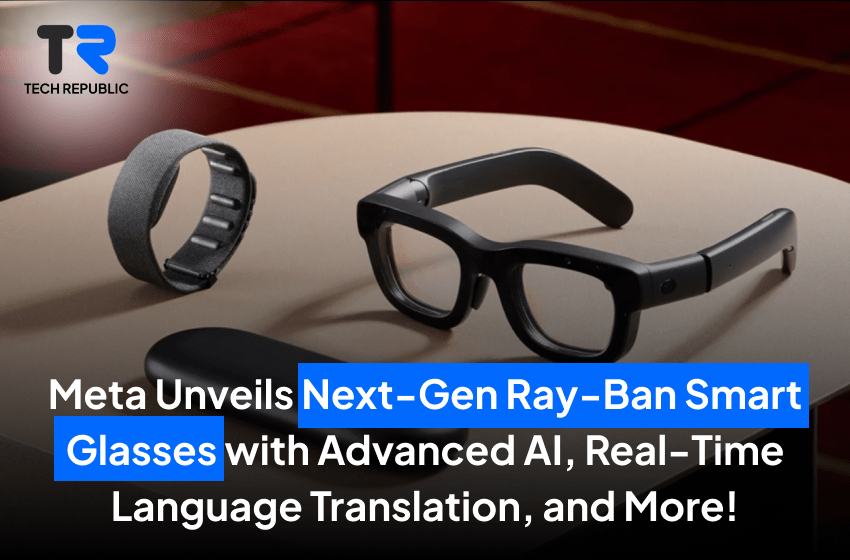
TECH REPUBLIC
PREMIUM PRODUCTS, AFFORDABALE PRICES
PREMIUM PRODUCTS, AFFORDABALE PRICES

In a move that could reshape how we interact with wearable technology, Meta CEO Mark Zuckerberg has announced groundbreaking updates to the company’s Ray-Ban Meta smart glasses. These enhancements, slated for release later this year, position smart glasses as a potential contender for the next major consumer device.
The updated Ray-Ban Meta smart glasses will introduce powerful AI-driven features, seamlessly blending familiar smartphone functionalities with cutting-edge innovation. Among the most exciting developments are real-time AI video processing and live language translation—tools designed to make smart glasses a more natural extension of everyday life.
Real-Time AI Processing: Smart Glasses Get Smarter
One of the standout features of this new iteration is real-time AI video processing. Currently, the glasses allow users to capture images and receive verbal descriptions of them. However, the forthcoming upgrade will elevate the user experience by enabling live, interactive responses. Imagine preparing a meal or walking through a scenic location and simply asking your glasses for information. The glasses will be able to analyze and verbally respond, thanks to Meta AI, creating a fluid and interactive experience that blurs the line between wearable tech and human-like assistance.
Zuckerberg’s demonstration showed off how users can inquire about the food they’re cooking or ask questions about their surroundings, with the AI analyzing the environment and providing answers in real time. While these capabilities sound futuristic, how fast and effectively the AI can process live video remains to be fully tested—especially as tech giants like Google and OpenAI are developing similar AI-driven devices.
Live Language Translation: Breaking Down Communication Barriers
Another significant feature is real-time language translation, which promises to revolutionize global communication. English-speaking users will soon be able to converse with speakers of French, Italian, or Spanish, with the glasses translating conversations on the fly. This is just the beginning, as more languages are expected to be added to the roster over time.
This feature could prove to be a game-changer for international travelers, business meetings, and even casual interactions with people from different cultures. Real-time language translation would not only make conversations easier but also break down language barriers in an increasingly globalized world.
Memory Like No Other: AI Reminders
The new Ray-Ban Meta smart glasses will also introduce AI-powered reminders, a useful tool that allows users to remember items they’ve interacted with visually. For example, if you’re looking at a jacket and want to show it to a friend later, simply ask the glasses to “remember” it. The AI can store that image, making it accessible when you need to retrieve or share it later.
This added functionality is another step toward integrating smart glasses into our daily routines, making them more than just a cool gadget but a genuinely helpful tool.
The Future of Wearables
With these new features, Meta is making a bold statement about the future of smart glasses. They are not merely passive devices for recording or taking calls—they are evolving into sophisticated companions that can assist, translate, and even remember for us.
While competition from companies like Google and OpenAI is heating up, Meta’s commitment to innovation and its vision for smart glasses as everyday essentials could very well shape the next era of wearable technology.
2024 is shaping up to be a big year for smart glasses, and it’s clear that Meta is betting big on their success.






WhatsApp us
Exchange:
You can exchange any product purchased from Techrepublic.pk within 7 days of purchase under the following conditions:
To raise a dispute, please notify us within 7 days of delivery by contacting our support team via email at hello@techrepublic.pk or by calling 0332 272 2666. Each dispute will be evaluated on a case-by-case basis, and we strive to find a fair resolution for both parties.
For damaged items, it is essential to provide an unboxing video as evidence. Please email the video to hello@techrepublic.pk within 7 days of purchase to initiate the replacement process.
Returns:
If a product received does not match the description on our website, you have 7 working days from the date of delivery to claim an exchange the order. To initiate a return, the product(s) must be undamaged, unopened, and returned with all packaging materials and documentation.